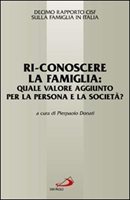Tenth Report
Recognize the Family: Which Surplus Value for the Person and for Society? 2007
 In front of urgency to recognize the so called “new families”, named with different labels (civil unions, cohabitation more uxorio, homosexual cohabitation etc.) and in front of the growing recognition already obtained or obtainable for these forms of aggregation, which are the reasons that still can motivate the support to “ the” family?
In front of urgency to recognize the so called “new families”, named with different labels (civil unions, cohabitation more uxorio, homosexual cohabitation etc.) and in front of the growing recognition already obtained or obtainable for these forms of aggregation, which are the reasons that still can motivate the support to “ the” family?
In other words: why can we still talk about a “family” which maintains its differences with other social forms that pretend to be called families, or at least, to have the same treatments?
Which differences - if existing- can justify the theoretical and practical distinctions, that still let us talk about family instead of civil unions or other?
From one side, those who sustain the rights of people that cohabitate to receive equal, similar or analogous recognition as that given to the family, are asked to demonstrate in what these unions are equal, similar or analogous to the family.
From the other side those who sustain the specificity of the family have to show - with new reasons- why the family can not be assembled to other forms of life in common.
The answers can not be easily given. Many think that the problem can be solved in a simple way, giving the title of family to all registered forms of cohabitation. But as this way of solving problems can have a linguistic utility, in the sense that it can be useful in ordinary daily life- just to understand each other- this way does not resist one only minute when defining the concrete rights and duties of the persons that adopt one or another form of life.
It is not only a problem of public recognition for example in making use of the benefits of the welfare state. It is also about recognition between private (for example the division of inheritance) , and before this it is about an inner and existential problem of the single individual, when he realizes that he does not recognize himself in a personal and familiar identity he believed to have.
The Report intends to shine a new light on these aspects, so relevant in our social organisation.
The family between past and future: the challenge of recognition
Pierpaolo Donati
Recognize the family through its surplus value
Pierpaolo Donati
The value of the family in Italy and in Europe between continuity and change
Gabriele Pollini
Families on the borderline between familiar and communitarian sphere
Giovanna Rossi, Donatella Bramanti
Identity of the migrant family and cultural diversity
Eugenia Scabini, Vittorio Cigoli
Metamorphosis of today’s family and psychopathology: clinical observations
Franco Poterzio
Family and happiness: an analysis of the relation between conditions, values, family relations and individual well-being
Luigino Bruni, Luca Stanca
The surplus value in the institutionalisation of the family in respect to its privatisation
Andrea Bettetini
What means “recognize” the family from a juridical point of view?
Francesco D’Agostino, Fabio Macioce
A reflexion on the surplus value of the family in a historical perspective
Lucetta Scaraffia
Recognition as a responsibility of the family and towards the family
Pierpaolo Donati